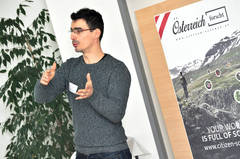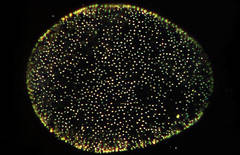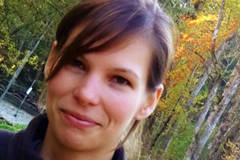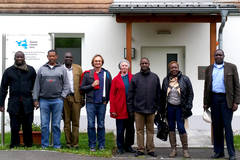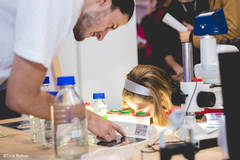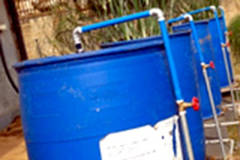Around the globe we can observe, that lakes are getting warmer, also Lake Lunz. The temperature rise implicates movements of fish, plankton and algae. Following an invitation of the Naturkundlichen Gesellschaft Mostviertel the working-group leaders Martin Kainz and Robert Ptacnik held a talk in Scheibbs on March 11th about this issue. Many intrested listeners took part at this evening.
Scientific projects which are performed with the help of interested amateurs – this method is called Citizen Science. To raise its quality was in the focus of the „Second Austrian Citizen Science Conference“, which was held on 18th and 19th February at WasserCluster Lunz.
Csaba Vad, member of the WasserCluster team, was awarded one of the treasured Marie-Curie-Fellowships, which are funded by the Horizon 2020 Programme of the EU. In the focus of the two-year project is the research of chrysophytes, which are predicted to increase with climate warming, what implys serious consequences for trophic efficiency and fish production.
Glaciers and streams are in the focus of Christina Faschings PhD-thesis. She investigated the role of dissolved organic matter (DOM) for carbon cycling. The degradation of terrestrial DOM in streams was for example shown to potentially contribute to CO2 evasion to the atmosphere. In October Christina Fasching successfully finished her thesis.
A delegation of top-ranking researchers from the universitys Egerton (Kenya), Bahir Dar (Ethiopia) and Cape Town (South Africa) visited WasserCluster Lunz in the end of September. Many of the scientists worked in Lunz in the course of their training at the Biological Station Lunz. They were impressed by the development of the research center and interested in cooperations for the future.
From virtual skydiving to catching zooplankton – at the European Researchers’ Night on September 25th in Vienna more than 100 scientists at more than 50 stations provided insights into science and research. The researchers of WasserCluster were there too.
In developing countries, including East Africa, people are still grappling with health problems due to pollutants in municipal wastewater effluents. Najib Bateganya Lukoyaa investigated in his PhD thesis how constructed wetlands can help in this case. In september he successfully finished his thesis.
Abstract
The two hungarian researchers Csaba Vad and Andràs Abonyi received each an Ernst Mach Grant from the Austrian Agency for International Cooperation in Education and Research (OeAD), which enables them to work five months at WasserCluster. Both scientists pursue the research of pytoplankton. Csaba Vad started already in September, Andràs Abonyi will work at WasserCluster from October on.





